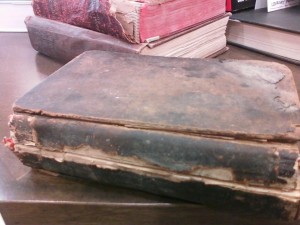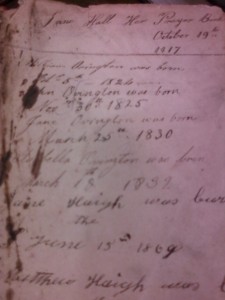It is of questionable value and in its current condition it has little worth as a reference, but if this old tome could talk, what a story it could tell!
Jane Hall owned it. She inscribed her name and date just inside the front cover on October 19th, 1817. Likely she used a dip pen with a calligraphic-type nib to write:
Jane Hall Her Prayer Book
The volume is The Book of Common Prayer (although the complete title lists much more than those five words). Originally written in 1549, it contains a collection of prayers and rites used in the Anglican Church and was the first book written in English to contain daily and Sunday worship services. The black and charred appearance of the cover is the result of years of fireplace smoke rolling up over the mantle, where the book apparently rested when not in praying hands. Heat and smoke dries out book leather to the point that it eventually looks like it has gone through a house fire.
It is clear from the variance in the old ink that Ms Jane later made additional notes throughout the first three pages of the book. Regrettably, she did not record how those bearing the names were related to her, or where those listed actually lived. You can click on the image to see a larger version of her handwriting, penned with enough care that there are no cross-outs or do-overs.
I’m guessing the book was passed down through the family of Ms Hall, making its way across the Atlantic to the American frontier and eventually becoming orphaned somewhere near Broken Arrow, Oklahoma, where it is today. How it managed that expedition is the story I would love to hear.
Since the book is for the Anglican faith and was published at Leeds, England – my guess is that Ms Hall resided in the Old World at the time she acquired the prayer book. In addition, the names she wrote within the pages are surnames and spellings relatively uncommon in America. The first three notations recorded the birth dates of William, John, Jane, and Isabella Ovington, whose last name originated in the area of Northumberland, England. There is an English census record of the birth of an Isabella Ovington in Durham England in 1832, the name and matching date that Ms Hall noted in her prayer book. They could be the same person… who knows? In the 1840 US Census, there were only about five families named Ovington who made it into the official registry, residing in the states of NY and OH. By 1920, there weren’t very many more.
The other pages mark the births and deaths of individuals named Haigh, Hartley, Kyle, Bell, Holgate, and Baseter. There were about 25 Baseter families in the US by 1880 – again, a pretty scarce name with that spelling. Of course, Ms Hall could have been an atrocious speller, but she has a legible handwriting and must have spent some time at her book-larnin’.
The last recorded date marks a death in 1878.
Here is my best guess. Ms Jane was unmarried when she acquired the prayer book and inscribed her name inside. She probably married a Mr Ovington – most likely the John Ovington that is listed on the second page as having been born in 1798. The four other Ovingtons were in all likelihood their children, with births recorded between 1826 and 1832. The remainder of the names might well have been those of the spouses of her children – who knows?
The book might: if it could only tell its story.

